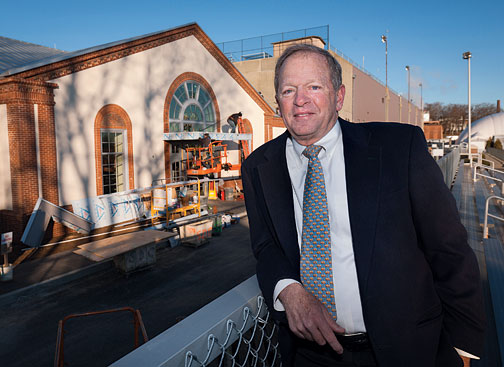Mike “Goldie” Goldberger, who in December announced he would be retiring as Brown’s athletic director at the end of the academic year, has been a familiar face on campus over the last thirty-nine years. He arrived in 1973 as an assistant football coach under head coach John Anderson, who’d known Goldberger as a player when Anderson was coaching at Middlebury. Since then, Goldberger has been head freshman football coach, assistant baseball coach, facilities director, and assistant athletic director. After serving as the liaison between the sports teams and the admission office, Goldberger became associate director of admission in 1985 and director ten years later.

BAM What do you think is your greatest accomplishment as athletic director?
MG The things of which I am most proud would be the academic performance of the student-athletes who are here. When you look at how we’ve stacked up in some of the APR [Academic Performance Report] rankings, those are the things I’m proud of.
BAM What about physical growth? The athletic complex on campus will expand in the spring when the Nelson Fitness Center, the Katherine Moran Coleman Aquatics Center, and the David J. Zucconi ’55 Varsity Strength and Conditioning Center all open up.
MG I’m certainly extremely happy about that. They are going to be such an addition to Brown. And it all came about through the great work of the Brown Sports Foundation and the generosity of some amazing donors. I sort of feel like I was carried along a little bit on the ride.
BAM How has the University’s attitude toward sports changed during your tenure, if at all?
MG The Corporation really stepped up and said, “We really do value athletics. We really do value the contributions athletes make to this University, and we really owe it to our athletes to provide them with a quality experience.” That led to some very hard questions in terms of do we have the right size, do we need to reduce the scope [of our program] to try to make the situation better for those who remain. The fact that the Corporation and the president stepped up to say this is important is, I think, a very, very strong statement.
BAM A special committee just finished a review of Brown athletics, and it urged that the University make sure student-athletes are truly representative of the institution’s academic values. How does Brown stack up on this issue compared to the other Ivies?
MG Brown excels in this area. What the Ivy League says is that student-athletes must be generally representative of the student body, and it uses an academic index to measure that. Brown has far exceeded every target that has been set by the Ivy League. So if you’re asking whether Brown student-athletes are as representative as those that you would find at any other Ivy League school, the answer is yes and then some.
BAM Then why the concern?
MG I think what President Simmons is concerned about is that it’s not healthy if people look at a student and say, “Oh, well, he only got in because he is a student-athlete.” I absolutely understand that concern. But I also absolutely don’t want to see us put at a competitive disadvantage by saying we are going to have higher standards than the league has. I want to make sure we’re playing by the same rules as the rest of the league.
BAM What advice do you have for the next athletic director?
MG I would say we have an
amazing group of student-athletes. We also have an amazing staff and
coaches. Focus on their expertise, take advantage of what they have to
offer. It’s something I had to do because I didn’t have that athletic
expertise. Brown people are more than willing to share their opinions,
which probably means you should take everything with a grain of salt.
But these are very bright people, who really care about what they do
and are really devoted to it.
BAM What do you think you will miss the most about Brown?
MG That’s easy. It’s the
student-athletes. I love the staff I work with. Brown is a place of
amazing people, bright people. They challenge you, and you just feel
engaged all the time. But in terms of what’s most rewarding, it is the
student-athletes.
BAM What will you miss the least?
MG There are always
problems. It’s the nature of what we do. People are so passionate about
their program, parents are so passionate about their children. But
there are often issues that come up that really aren’t the core of what
we do. They take a lot of time, they distract from the things we do
want to be working on, but they are important. They have to be done.
BAM What are your plans for retirement?
MG Certainly more time
with family. That’s really important to me right now. I certainly love
my work with the Special Olympics, and I’m not looking to doing
anything other than volunteer work right now. I might feel very
differently two years from now, but that’s what I’d like to do now.




